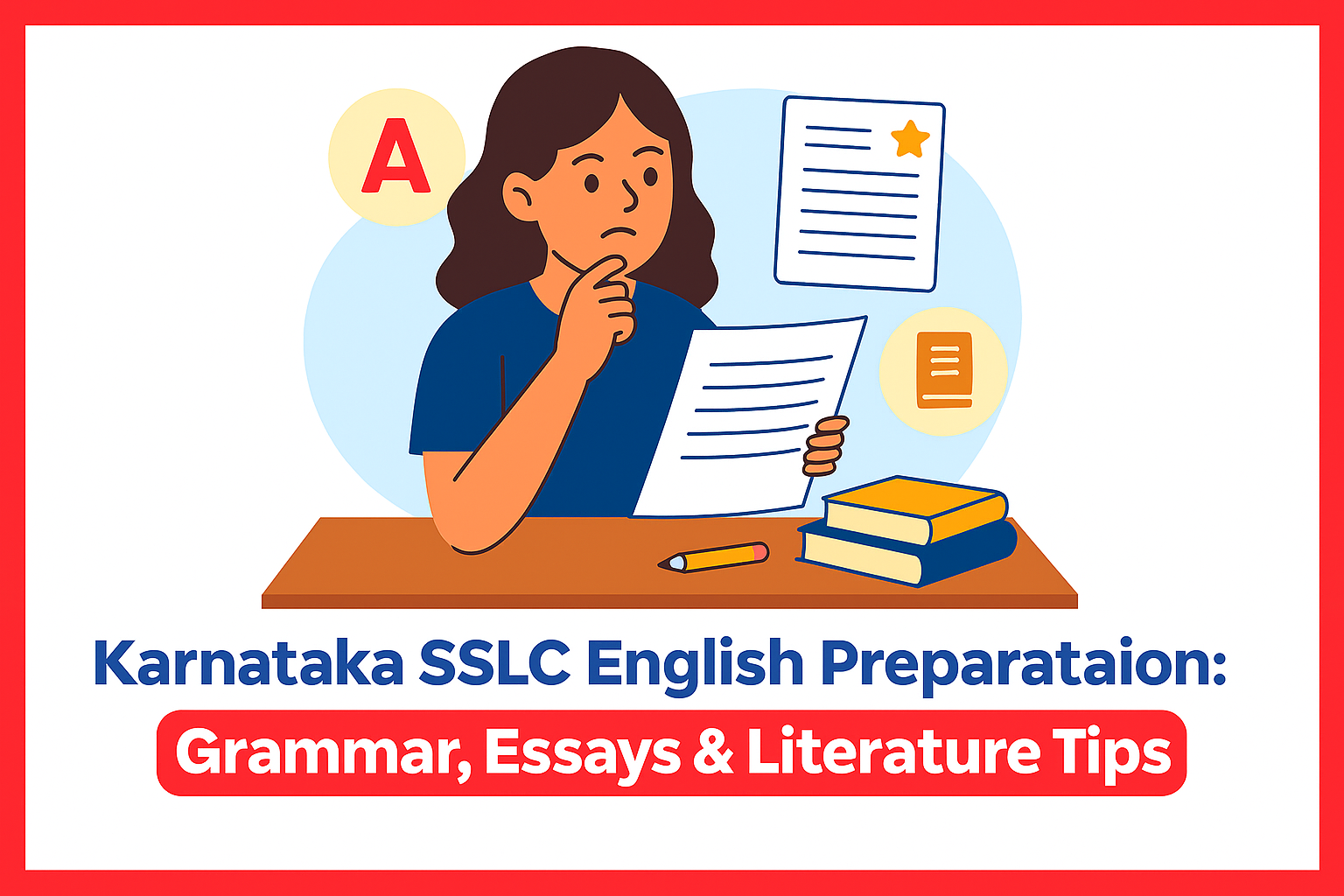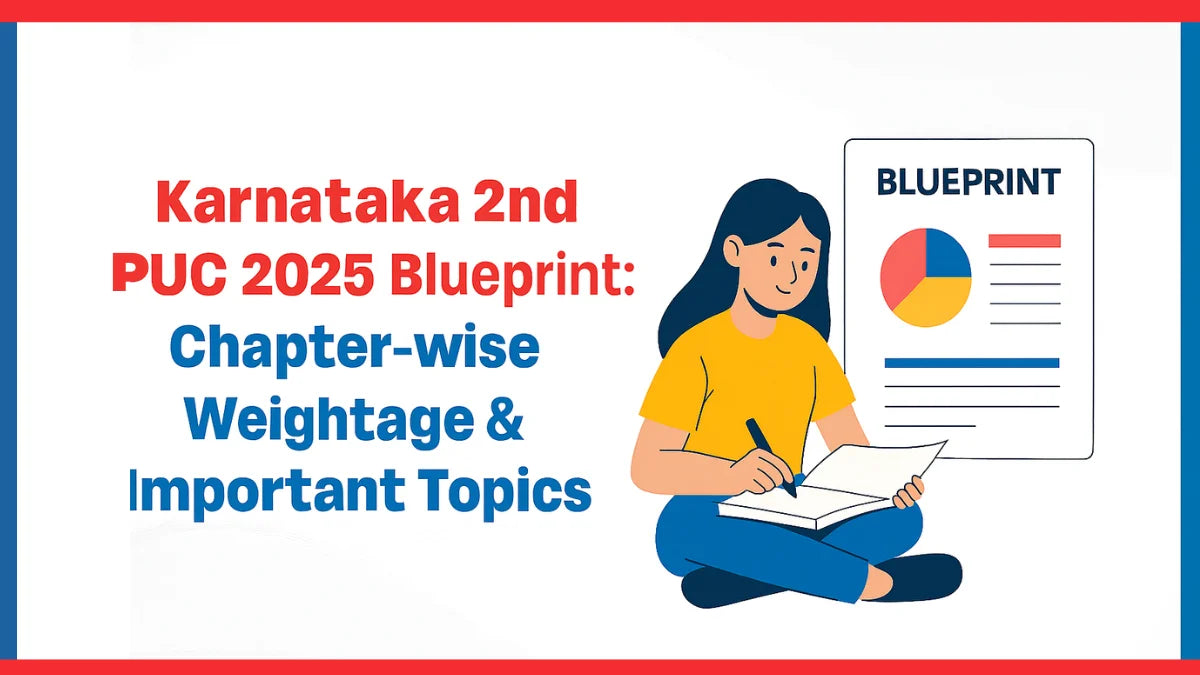Chemistry is one of the most important subjects in the Karnataka PUC. In any type of examination, be it board or competitive entrance examinations like CET, NEET and JEE, Chemistry is important to study. There are three major parts of Chemistry, which is Organic Chemistry, Inorganic Chemistry and Physical Chemistry each requiring a specialized strategy.
In the following sections, we will navigate through each part of Chemistry, discuss the preparation strategies and how to enhance your performance with smart study strategies.
Why should you care about Chemistry in the PUC examinations?
-
Chemistry is a natural scoring subject if the concepts are clear.
-
Many entrance exams have questions which are borrowed from the PUC syllabi.
-
Preparation distributed amongst these units of Organic, Inorganic and Physical Chemistry will give you ample confidence.
The PUC Chemistry Syllabus
The Karnataka 2nd PUC Chemistry syllabus discussed:
-
Organic Chemistry - carbon compounds, mechanisms, functional groups and biomolecules.
-
Inorganic Chemistry - periodic classification, coordination compounds, metallurgy, elements in the s-block and p-block.
-
Physical Chemistry - thermodynamic principles, kinetics, electrochemistry, equilibrium and solid state.
If you understand the concept of each unit, you will be confident in dealing both the numerical and correct answer to ensure you get full marks on theory based questions.
Preparing for Organic Chemistry.
Organic Chemistry features prominently on the exam paper. To properly prepare for Organic Chemistry, requires clarity of thought in terms of reaction mechanisms and functional groups which is to be understood to have success. Give it ample time and keep with current your studies to maximize your understanding.:
Key Topics
-
General Organic Chemistry
-
Alcohols, Phenols, and Ethers
-
Aldehydes, Ketones, and Carboxylic Acids
-
Amines
-
Polymers and Biomolecules
Tips to Succeed
-
Familiarize yourself with nomenclature rules.
-
Regularly practice the steps of the mechanism.
-
Utilize flow charts for reaction pathways.
-
Revise with summary tables for quick reference.
Inorganic Chemistry Preparation
Inorganic Chemistry tends to be memory-based, but can be a highly scoring section if you revise systematically.
Key Topics
-
Periodic Classification
-
s-Block and p-Block Elements
-
Coordination Compounds
-
d-Block and f-Block Elements
-
Metallurgy
Tips to Succeed
-
Create tables for important properties (oxidation states, ionic radii, etc.)
-
Revise NCERT-based questions as they appear in the exam as it is.
-
Mnemonics to remember reactions and trends.
Physical Chemistry Preparation
Physical Chemistry tends to be more theoretical with problems related to it. You need conceptual clarity along with good numerical practice.
Key Topics
-
Thermodynamics
-
Chemical Kinetics
-
Solid State
-
Equilibrium
-
Electrochemistry
Tips to Succeed
-
Revise formulas on a daily basis.
-
Do a lot of numerical problems.
-
Practice derivations as it will come as 3 marks or 5 marks.
-
Revising graphs and equations together is ideal if they are covered in the same class.
Smart Study Concurrent Revision
To study all sections to the best of your ability use the following methods:
-
Distribute Your Time: Study equal time each week between Organic, Inorganic and Physical Chemistry.
-
Daily Practice: Try to solve at least 15-20 questions daily.
-
Revise Weekly: Allocate weekends for revision regarding week topics.
-
Mock Tests: Attempt full-length practice tests.
-
Error Analysis: Check your weak areas and re-study them.
Balancing Boards and Competitive Exams
During class 12, students struggle to balance between board exams and competitive exams like CET, NEET, and JEE. The good news is that there is considerable overlap with PUC Chemistry. By maintaining a structured routine of daily NCERT review, taking periodic mock tests, and problem-solving from additional resources, you can manage to prepare for both exams. Then your board preparation can provide a solid foundation for your competitive exams and lead to time and effort savings.
Read More: What is the Passing Marks Out of 80 in 2nd PUC Karnataka 2025-26?
Practicing using the right resources
The right resources will have a significant impact on your Chemistry preparation. Two of the more effective resources are:
-
2 puc question bank - This allows you to practice topic-wise and increases your confidence from the exposure to different question styles.
-
2nd puc previous year question papers - This will allow you to become familiar you exam trends, important chapters, and repeated questions/answers.
These tools will not only help to ensure that you study hard, but you will study smart.
Table: Comparison of Organic, Inorganic & Physical Chemistry
|
Aspect |
Organic Chemistry |
Inorganic Chemistry |
Physical Chemistry |
|---|---|---|---|
|
Focus Area |
Reactions, mechanisms, functional groups |
Elements, compounds, periodic properties |
Numerical concepts, formulas, derivations |
|
Difficulty Level |
Moderate to High |
Moderate (memory-based) |
High (conceptual + numerical) |
|
Scoring Potential |
High if reactions are clear |
Very high with proper revision |
High with regular problem practice |
|
Best Preparation Method |
Flowcharts & reaction practice |
Tables, mnemonics, direct NCERT revision |
Formula sheets, problem solving |
How to Use Question Banks Effectively
A 2 puc question bank is a treasure for systematic preparation. Here’s how you should use it:
-
Solve questions chapter-wise after finishing each unit.
-
Track your accuracy and speed.
-
Attempt mixed chapter tests before the final exams.
By practicing this way, you not only revise concepts but also strengthen exam readiness.
Importance of Solving Previous Year Papers
The 2nd puc previous year question papers are crucial for:
-
Understanding the exam pattern.
-
Identifying high-weightage topics.
-
Improving time management.
-
Boosting exam confidence by practicing real questions.
Make sure you solve at least the past 5–7 years’ papers before your board exam.
Additional Tips for Success
-
Make a Formula Book: For quick revision of Physical Chemistry.
-
Use Color Codes: Highlight Organic mechanisms in one color and Inorganic reactions in another.
-
Group Study: Teach friends—explaining concepts makes you retain them better.
-
Stay Consistent: Daily study is better than last-minute cramming.
-
Mock Exams: Simulate exam conditions for better performance.
Conclusion
Chemistry in Karnataka PUC may seem challenging at first, but with the right strategy, it can become one of your strongest subjects. Organic, Inorganic, and Physical Chemistry each demand different preparation methods, but together they build a complete understanding of the subject.
Using resources like a 2 puc question bank and practicing with 2nd puc previous year question papers will give you an unbeatable edge. Stay consistent, revise smartly, and practice regularly. With dedication, scoring high in PUC Chemistry is completely achievable.
FAQs
Q1. How can I improve my Organic Chemistry for 2nd PUC?
Focus on reaction mechanisms, solve practice questions daily, and use flowcharts to connect reactions.
Q2. Is Inorganic Chemistry memory-based or conceptual?
It is mostly memory-based but understanding periodic trends makes it easier to remember.
Q3. How many hours should I dedicate to Chemistry daily?
At least 2–3 hours daily, dividing time equally among Organic, Inorganic, and Physical Chemistry.
Q4. Are previous year papers enough to score well?
They are highly helpful but should be combined with question banks, notes, and NCERT revision for maximum results.
Q5. What is the best way to revise Physical Chemistry?
Revise formulas daily, solve numerical problems, and practice graphs and derivations.











